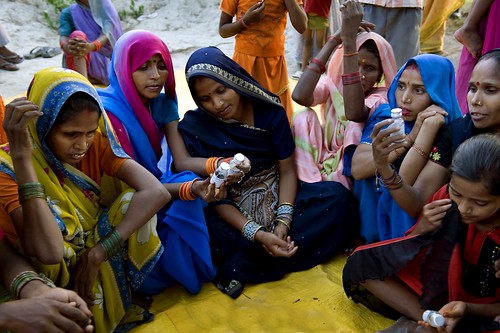USAID Fights Fake Drugs and Helps Countries Find the Fakes
USAID raised the counterfeit drug alarm to Congress in a report including data on pervasive
fake anti-malarials and the success of medicine quality control assistance to 20 nations. USAID is
successfully fighting the impact of substandard medicines in developing countries through drug
authenticity training and technical assistance.
“Unfortunately, many developing countries lack the capacity to protect their citizens in this way, much less to protect them from unscrupulous drug manufacturers and vendors. What should be a matter of trust is more like a tragic game of chance with devastating odds,” said Dr. Maria A. Miralles, USAID’s
Senior Pharmaceutical Management Advisor.
To this end, USAID has also been supporting the development of a tool to enable regulatory authorities to evaluate their quality assurance systems in more than 20 nations, leading to recalls of substandard and counterfeit medicines and closure of illicit pharmacies.

Indian women looking at medicine
by USAID via Flickr.
USAID raised the counterfeit drug alarm to Congress in a report including data on pervasive fake anti-malarials and the success of medicine quality control assistance to 20 nations. USAID is successfully fighting the impact of substandard medicines in developing countries through drug authenticity training and technical assistance.
USAID has raised awareness on the impact of substandard medicines on the quality of health care in developing countries and is developing tools to improve quality assurance because “health systems with inadequate regulatory capacity are ill-equipped to control the entry of counterfeit and substandard medicines and products into the marketplace….Access to poor-quality medicines can contribute to the emergence of drug resistance and an increased need for second-line medicines, which can add to the cost and potential duration of treatment.” In its report, USAID estimated that 30% of the world’s population lacks regular access to medicine, and that the proportion is greater than 50% in the poorest areas of Africa and Asia.
“Unfortunately, many developing countries lack the capacity to protect their citizens in this way, much less to protect them from unscrupulous drug manufacturers and vendors. What should be a matter of trust is more like a tragic game of chance with devastating odds,” said Dr. Maria A. Miralles, USAID’s Senior Pharmaceutical Management Advisor.
To this end, USAID has also been supporting the development of a tool to enable regulatory authorities to evaluate their quality assurance systems in more than 20 nations, leading to recalls of substandard and counterfeit medicines and closure of illicit pharmacies. Monitoring is currently conducted largely through more than 100 sentinel sites that can perform product quality testing with measurable results. One sentinel site in Ghana detected a counterfeit antimalarial drug which lacked any active ingredient. It was promptly removed from pharmacies by the Foods and Drug Board, preventing further harm to malaria patients using the fake drug.
Miralles added, “Antimicrobial medicines with sub-therapeutic quantities of active ingredients have contributed to the rise in resistant strains of various infectious diseases rendering existing cheaper products useless and prolonging treatment periods.” She added that there are without doubt other undocumented cases of genetic mutation in infectious diseases due to substandard drug use that will impact health care in the future.
Public health NGOS who provide healthcare have a responsibility to insure that safe, authentic drugs in proper doses are available for treatment, believes Miralles. For example, in order to ensure quality products for multi-drug resistant tuberculosis patients, “USAID has been providing technical assistance to selected manufacturers to be able to meet internationally recognized Good Manufacturing Practices and for the preparation of dossiers for tuberculosis drugs for submission to WHO [for qualification purposes],” she explained.
USAID has helped countries establish and strengthen post-marketing surveillance systems to sample and test medicine in Latin America, Africa, and Southeast Asia. Post-marketing surveillance data was successful in curbing a regional anticounterfeit operation in Southeast Asia that led to the withdrawal of $6.7 million worth of sub-standard medicines.
But USAID has still more work to do as fake medicines continue to be a problem in many countries. A World Health Organization and U.S. Pharmacopeia Drug Quality study documented quality control failure rates of antimalarials provided by the public, private and informal sectors at 44% for Senegal, 30% for Madagascar and 20% for Uganda, states the report. “The sale of counterfeit, altered, and poor- quality malaria drugs is particularly acute in developing countries due to the limited regulatory capacity of country health systems and their inability to control the entry of antimalarials into the marketplace.”